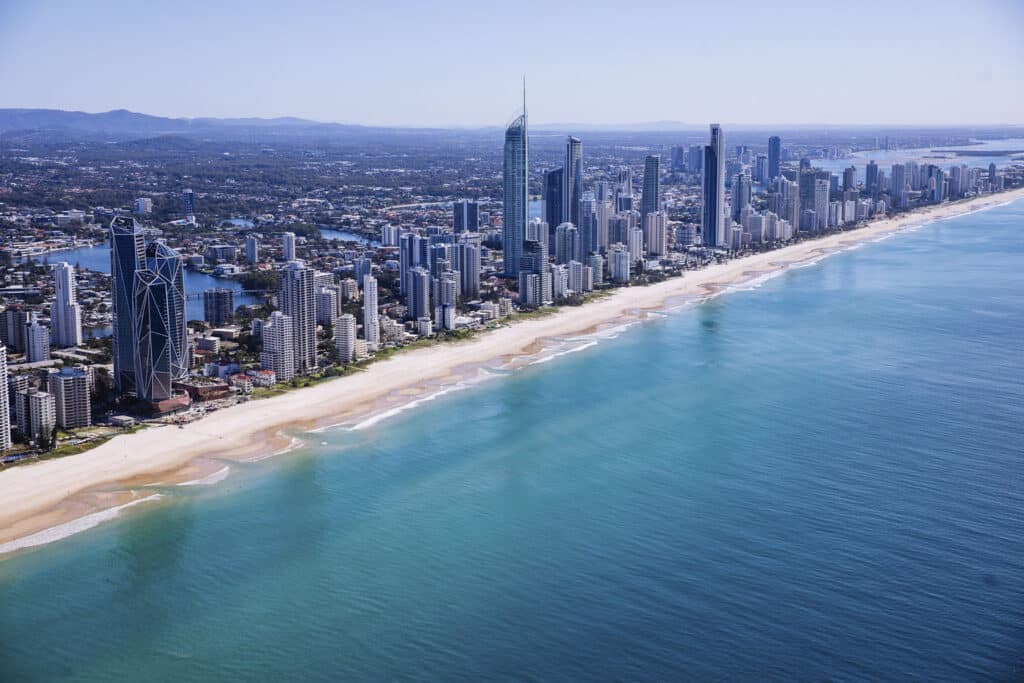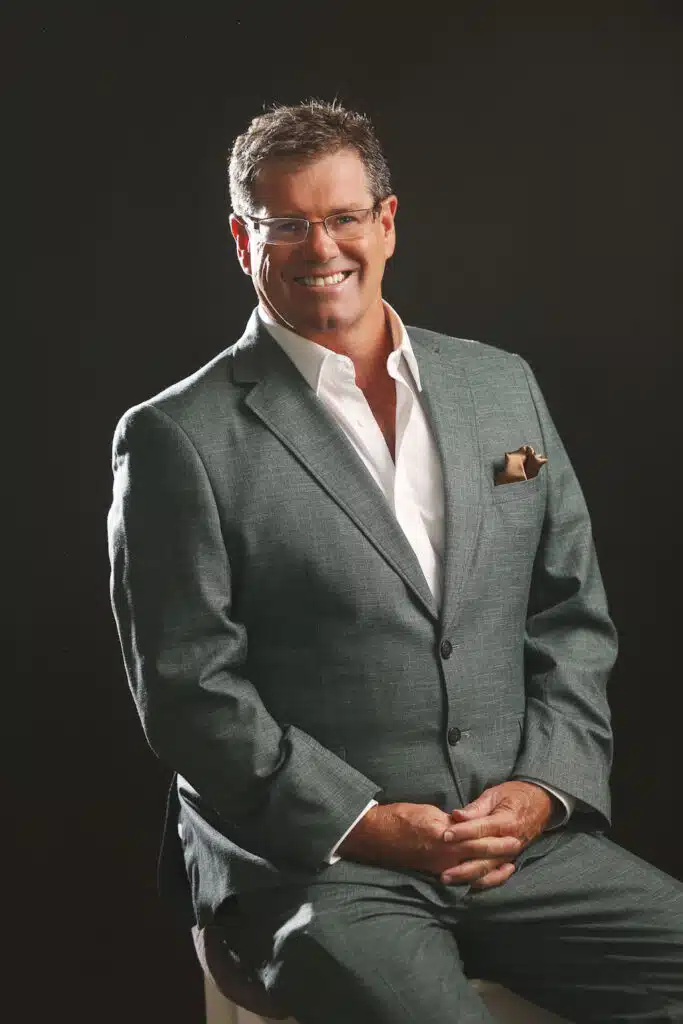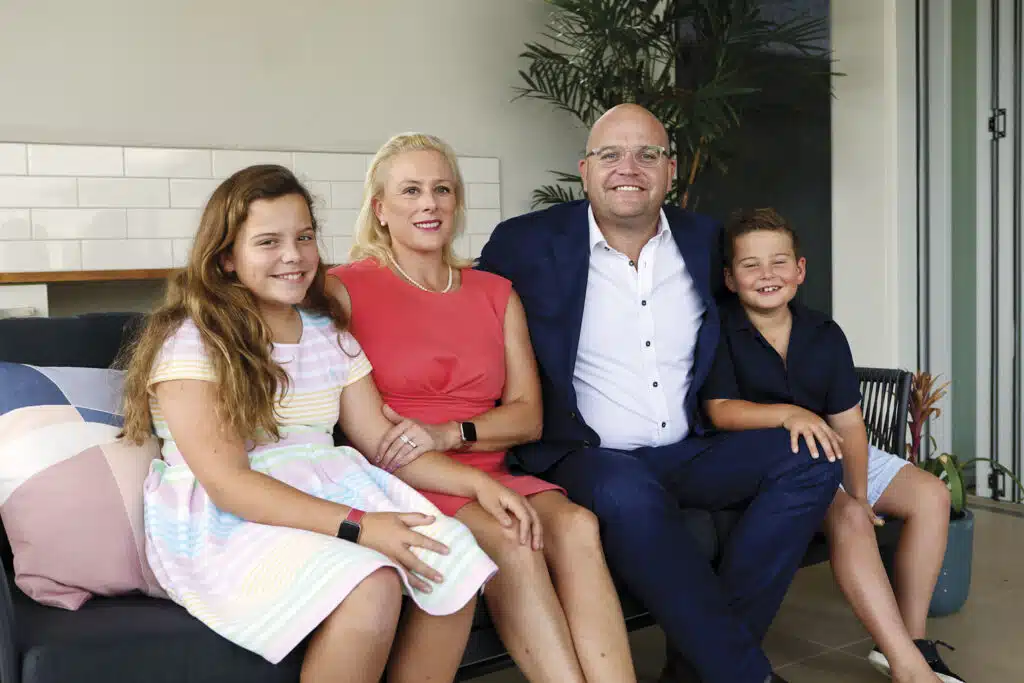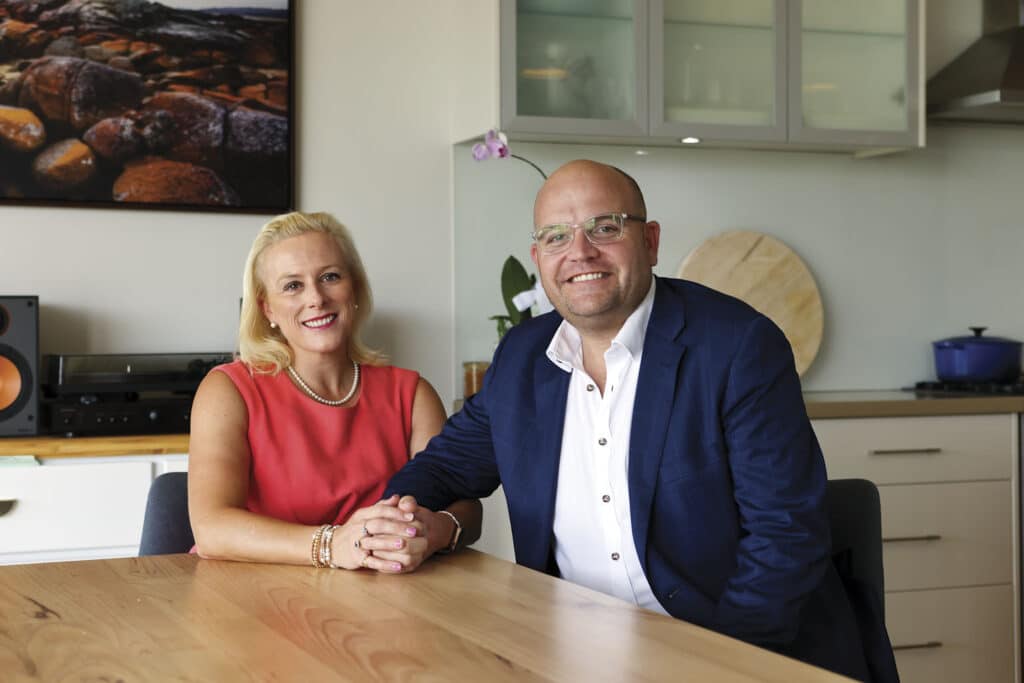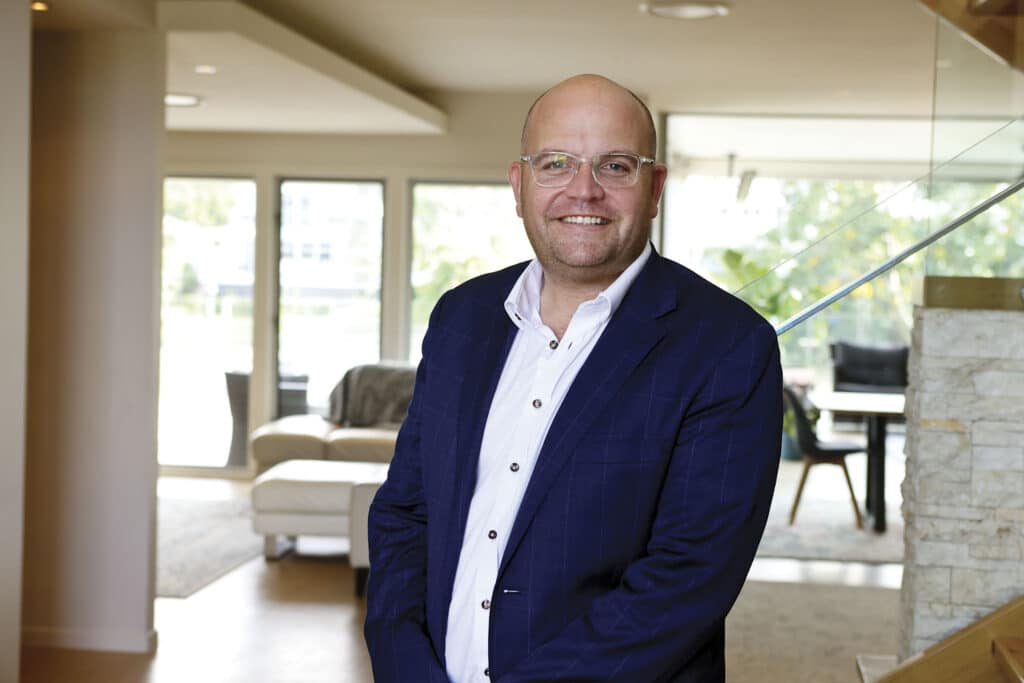PEOPLE
Baker’s Delight – Managing the city’s growth
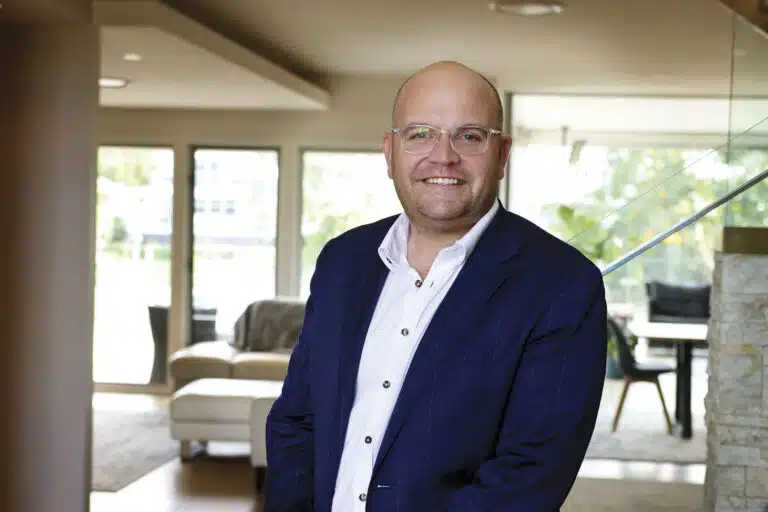
WORDS: Steve Hunt PHOTOGRAPHY Brian Usher - [email protected] Plus supplied
Tim Baker is on a mission.
A year into the role of CEO of the Gold Coast City Council, the city’s biggest employer with more than 4500 staff, Baker has already set a trajectory that, if successfully implemented, will create profound changes for the city.
The first? Get us out of the mindset and lack of vision that has too often plagued the Gold Coast.
That’s not normally the role of a bureaucrat, but Baker appears unconventional at the helm of one of the city’s most important jobs at such a critical juncture – where exponential growth has created creaks and groans as the Gold Coast seeks to further define itself.
One of the first implementations – the consolidation of Destination Gold Coast, Study Gold Coast, Placemakers, Major Events Gold Coast and HOTA – into a high-powered entity called Experience Gold Coast could not come soon enough.
Baker, a 41-year-old family man originally from Tasmania, has big plans.
“The whole idea is about creating one entity with one board and one CEO with a singular purpose and vision,” he says.
“The consolidation is about getting better alignment for big events and being able to attract more successful new events with one voice, whether it be a Harry Styles concert, Guns and Roses, or Blues on Broadbeach.
“Additionally, we make savings of around $7 million which gets rolled back into the entity with the guarantee that $1.5 million goes back into arts and music so the grassroots of our cultural activities don’t get forgotten.”
Experience Gold Coast will officially start on September 1 this year with a new CEO and board to be appointed to the new entity.
Leading media personality and avowed Gold Coaster Peter Gleeson says it’s time for the city to grow up, and Mr Baker and Mayor Tom Tate were the team to take it to the next level.
“The mediocrity has to stop, and this is a good starting point,” says Gleeson.
“The Gold Coast needs to position itself as the events capital of the Asia-Pacific.
“For too long the Gold Coast has basked in mediocrity and failed to bring the world’s biggest events here.
“We need to think much bigger than Cooly Rocks and Blues on Broadbeach.
“We need a big budget to bring the big-ticket events. Could you imagine an NFL Game between the San Francisco 49ers and Miami Dolphins?
“London wants to stage the NFL Super Bowl in 2026. Why can’t we have the same mindset?
“Experience Gold Coast is a big deal to make sure we secure these opportunities.”
Gleeson said it was a “no brainer’’ to double the size of the Gold Coast Convention centre.
He said the city was losing out to the capital cities because of the lack of a suitably sized arena.
“We missed the Tim Tszyu fight to Sydney. We missed the Volkanovski MMA fight to Perth.
“We need the big, big events. But we can’t do that without the right infrastructure. That has to be the first priority of any new events entity.’’
Gleeson said the city’s lack of tourism and events investment over the last two decades was “shameful’’.
“The Greenies have hijacked the city,’’ he said.
“No cruise ship terminal, no cable car, nothing. Only the $67 million spend on turning the Gold Coast Turf Club into a world class facility with night racing. But that’s it. What a sham.’’
So, who is Tim Baker?
Born in Tasmania, he has spent most of his career working in the public service – this being his first in local government.
His last job was as the head of the largest tourism provider in Tasmania, The Department of Primary Industries, Parks, Water and the Environment which included the responsibility for overseeing all of the state’s national parks.
During the Covid pandemic, he was responsible for border control and describes the role as ‘a big stressful job’.
He was Chief of Staff to the former Premier Will Hodgman, a role that exposed Baker to the inner machinations of politics and a range of other government departments.
An early career in financial services saw him enjoy a stint studying at Stanford University in the US.
So in 2022, at the ripe old age of 41, Baker and his wife Lizzie, daughter Charlotte (11) and William (8) headed north to the Gold Coast like hundreds of thousands before him – joining the 15,000 other people migrating to the Gold Coast every year.
“On a personal level I don’t say I’m a Tasmanian anymore. I’m a Gold Coaster formerly from Tasmania,” says Baker.
“And the more people I meet in this city and within council have a very similar story – moving to the Gold Coast to look for opportunities and start new lives and careers.
“This is the first time we as a family lived anywhere other than Hobart, so it has been an interesting transition that really couldn’t have gone any better.
“The kids have settled incredibly well at St Hilda’s and TSS and to be honest I under-estimated the quality of the schools that we have on the Gold Coast. I don’t anymore.”
Baker describes himself as ‘driven’, perhaps the by-product of growing up in a large family where competition was part of its DNA.
“I came from a big family with six siblings, and if you know what big families are like, there’s always an element of wanting to prove yourself.”
The second and most critical element since Baker’s appointment – replacing Dale Dickson who was in the CEO role for 16 years – has been to change the culture of the Council staff.
Not mincing words, Baker says the culture within Council was problematic on his arrival.
“When I first came here literally the first thing I did was undertake a comprehensive cultural survey which hadn’t been done for 10 years,” says Baker.
“We identified that we’ve got a problem in terms of the culture inside the organisation.
“Our survey pointed to the fact that we’ve got a fair bit of work to do to improve our culture. We have a risk averse culture. We have a culture where we don’t like to make decisions. And then when we do make decisions, we’re very rules based.
“Now that’s very common for public sector organisations. But we have some work to do, so we’ve kicked off a comprehensive programme called ‘the ‘One City Program’ (1CP) and implemented a range of programmes based around the improvements to the culture of an organisation. “Chief amongst these was firstly, defining what the purpose of the organisation was, which is quite simply about enhancing the Gold Coast way of life.“And secondly, by defining what high performance looks like inside the organisation, delivering more than what’s expected of us and then being able to prove it to our stakeholders, principally the ratepayers.
“So we did the purpose work, we did the high performance work, and then we came up with a set of high performance principles on what good behaviours look like inside an organisation.
“The whole purpose is about ensuring that ratepayers’ funds are spent in the best possible way to deliver the best possible outcomes for the city.”
So, did Baker observe wastage within Council?
“Any public sector organisation – and I’ve worked in quite a few – has areas where they can get efficiencies,” he says.
“We found two per cent (savings) pretty easily and that equated to $18 million of ratepayers’ money that we’re able to save just by getting smarter about things like contracting.
“And quite frankly, saying to managers who have not had that kind of pressure put on them before, ‘let’s just think a bit smarter about how we do things’.
“We’ll go to 4% and that will equate to 6% because of what we have done this year.
“One practical example is having staff on fulltime employment rather than as contractors which tends to cost us more per hour.
“It’s a great win for our staff because they get permanency of employment and we get savings. And we reinvest savings back into the business of running the city.
“One practical example is that there will be four new lifeguard towers on Gold Coast beaches in the next 12 months.”
“So we’ve taken some of these savings and applied them to frontline services which benefit visitors and the community at large.”
Baker says he is amazed at the quality of businesses on the Gold Coast.
“It’s actually an incredible place to live. The economy is diverse. It’s about much more than just tourism now,” he says.
“That’s been an absolute eye opener. For example, when I first arrived, I drove from one end of the city to the other, and I visited a rocket company, a shipbuilding company, the health and knowledge precinct. I saw the film and television industry – which is an incredibly important part of the economy.
“And that’s got to be our strategy, being more than just tourism while at the same time not killing the golden goose that is tourism.
“In transforming the Gold Coast into a thriving, modern city, you’ve got to have more than just tourism.
“One of my biggest observations is that we are a much bigger, much more vibrant, and much more interconnected city than I thought when I first arrived.”
Which brings us to the city’s biggest challenge – managing a population growth of 15,000 people per annum, something Baker agrees is a balancing act.
“We’ve done a lot of work inside the city administration about our purpose, which is around enhancing that Gold Coast way of life,” he says.
“Now, that’s going to be a challenge for the city as we continue to grow. Growth is good, because it brings jobs and opportunities to the city, as long as it’s managed very well.
“It’s also a reflection on the fact that people want to come here, which is a great thing.
“What we know is a population the size of Hobart is going to call the Gold Coast home by the 2032 Olympics in Brisbane.
Some 40 per cent of the population of this city lives in multi dwelling buildings and if we keep that growth trajectory some 40 per cent of the population will be living in high-rise buildings.
“The rest will go north to areas like Coomera and Pimpama.
“We’ve got to be really careful as a city about how we meet those growth targets, and we continue to get the trunk infrastructure in place to handle it.
“That is probably our biggest, single challenge and it is front of mind for everyone who works inside the city and front of mind for me as the CEO.”
Baker has three more years to complete this vision for the Gold Coast, with a four-year contract in place.
He says he is working hard to work collaboratively with Mayor Tom Tate and the councillors who are the ultimate decision makers when it comes to shaping the city.
“My job is to implement their vision and manage the expectations of our community, the ratepayers, under the weight of such enormous growth,” says Baker.
“With growth comes challenges but also opportunities and I see my role as facilitating the councillors’ vision along with ensuring our 4500-strong workforce is up for the challenge to meet ratepayers’ expectations.
“We all love the Gold Coast and we need to make sure we preserve what brought us all here in the first place while continuing to grow and maximise the opportunities that come with that growth.
“It really is a huge responsibility and one that I’m up for.”


